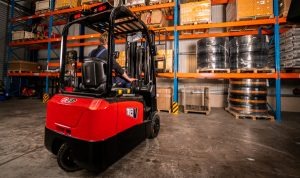During the last months, EP worked towards the introduction of our Li-Ion counterbalance trucks. After selling Li-Ion counterbalance trucks successfully in the Chinese market for over a year, we launch the products for international sale.
We are ready to release the first 50 trucks to our best partners around the world and start the revolution: Making Li-Ion available to the masses!
With the introduction of our well known TV8 Li-Ion Series three wheel counterbalance trucks, we facelift our proven, robust system into the world of Li-Ion (CPD18TV8).
To show you what the future of Li-Ion has to offer, we also introduce the L1. Our all-new, simple and robust 4 wheel CB truck. Increased Legroom, purpose build around the Li-Ion battery it is a worldwide first counterbalance truck, build around the advantages of Li-Ion technology.
To get your hands on one of the first 50 units Li-Ion CB trucks, please contact your account manager and find out if you are entitled to one of the very first units. The timeframe is short, availability too.
Duration: October 11th – November 11th